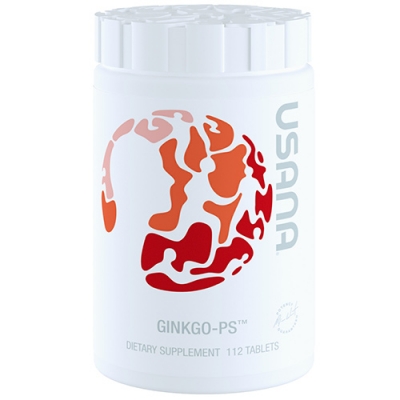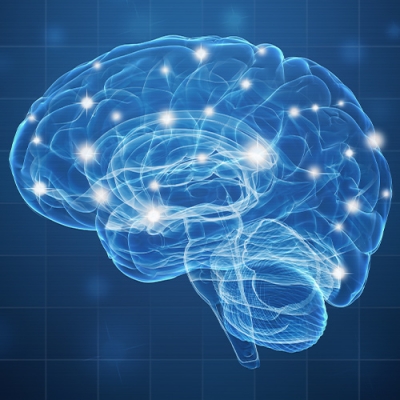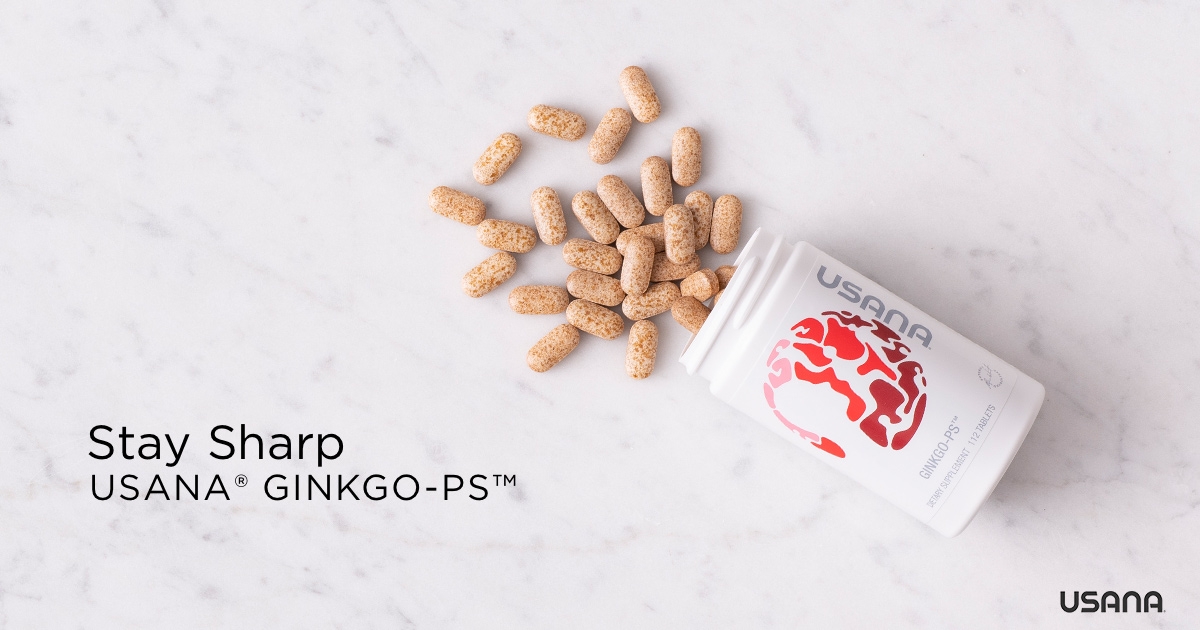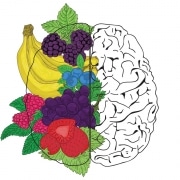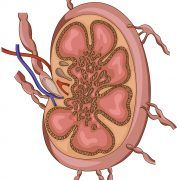Ginkgo-PS™
Ginkgo-PS™ is a Brilliant Blend to Help Maintain Your Brain
USANA® Ginkgo-PS™
Banish brain fade and support healthy cognitive function with a unique blend of Ginkgo biloba plus phosphatidylserine.*
Your daily life requires you to be at your mental best. Sometimes you need to remember where you left your car keys, memorize a new friend’s name, or learn skills for your career. No matter what, your brain is involved. And unfortunately, the modern world doesn’t really help it out. Along with constant distractions and demands on your attention, your body encounters environmental, emotional, and physical stresses that can make it harder to think straight. Not to mention the normal challenges of healthy aging. Help protect your cognitive health, so you can stay sharp every day, with USANA Ginkgo-PS™.*
Ginkgo-PS is a potent combination of Ginkgo biloba—an herb used for centuries to support mental acuity—with phosphatidylserine (PS)—a lipid (fat) that’s vital for keeping your brain cells fluid and healthy. Together, these ingredients provide these important brain benefits to you:
- Support for mental performance, memory, and general cognitive function*
- Support for the structure and function of neurons (brain cells)*
- Help for maintaining healthy circulation throughout the body and to the brain*
USANA’s distinctive formula combines a high-quality Ginkgo biloba extract with PS from soy lecithin into a single product. When used together, these ingredients provide you with excellent effectiveness for supporting memory and mental performance during your daily tasks.*
Make Your Brain the Center of Your Attention
Your brain is the control center of your life. It’s a complex organ made of specialized areas that each play a particular role. The brain keeps your body breathing, moving, and functioning on autopilot. It’s the source of your emotions and experiences of pleasure and pain. And, of course, learning, memory, intellect, imagination, and reasoning all stem from your brain.
Your brain manages all of these important activities by sending and receiving messages through specialized cells called neurons. These neural signals help control your movements, thoughts, sensations, and memories. Keeping your neurons healthy is essential for maintaining strong signals, so your brain can function quickly and automatically.
But age and different types of stresses could be impacting the health of your neurons.
Neurons are the longest living cells in your body. But the number of neurons you have steadily declines over the years, as part of normal aging. The speed at which neurons can communicate also tends to decrease over time. This is because the level of important lipids that are needed to send and receive messages gradually declines.
Exposure to sources of excessive free radicals, like pollution, unhealthy foods, and stress, can also damage your cells, including those in your brain.
But there’s good news. If maintaining sound cognitive function is on your mind, you can support your gray matter with some simple lifestyle practices:
- Feed your brain a calorie-conscious, healthy diet
- Stay active—mentally and physically
- Get plenty of sleep
- Exercise
- Stay connected with friends
Supplements can also help provide advanced levels of nutrients necessary to fuel your brain. Make a quality multivitamin and source of omega-3 fatty acids part of your daily routine, like the CellSentials and BiOmega. You can also add a boost of targeted brain support with the nutrients specifically selected to help preserve the health of your cognitive function in USANA Ginkgo-PS.*
Reinforce Your Recall with Ginkgo-PS
Does this sound familiar? A new acquaintance tells you their name. But 30 minutes later you draw a complete blank. These small daily memory tasks could be helped by the neuroprotective support of Ginkgo biloba in Ginkgo-PS.*
Extracts from the leaves of the ginkgo tree have played a longstanding role for supporting mental acuity in many traditional cultures. And scientists have examined the extract to determine its active phytonutrients. They found that the leaves of this ancient tree contain a complex mixture of flavonoid glycosides, terpenes, and other naturally occurring compounds that are beneficial for the body.*
Many studies have evaluated the effects that the compounds in Ginkgo biloba may have on cognitive function. Results have been mixed. But there is evidence that the herb can help maintain the health of your brain. In fact, Ginkgo biloba has come to be known in some circles as an effective “nootropic,” which is a substance that can support mental performance. There’s 100 mg in a daily dose of Ginkgo-PS to provide you with this support in two key ways: *
- Act as an antioxidant to fight free-radical damage and protect the health and function of cells, including your neurons.*
- Facilitate vascular health and blood circulation throughout the body to deliver nutrients and oxygen to the brain.*
Brain cells can be quite vulnerable to oxidative damage. Your master organ requires a great deal of oxygen, glucose, and fatty acids to function. And all of these compounds are susceptible to attacks and damage from free radicals. So, inhibiting or neutralizing the effects of free radicals using antioxidants, including those in Ginkgo-PS, becomes an important part of maintaining cognitive function.*
Maintaining healthy circulation, which helps support blood flow to the brain, is also critical. Your brain gets the substances it needs, including oxygen and nutrients, from blood that comes through your circulatory system. And carbon dioxide and waste products are also moved out and away from your brain in your blood.*
By protecting your brain cells and supporting healthy blood flow, Ginkgo-PS can have positive results for concentration, short-term recall, and general cognitive function.*
Ginkgo-PS Gives Your Neurons a Much-Needed Nutrient
Phosphatidylserine (PS) is another nutrient in Ginkgo-PS that can protect your brain. It’s even useful in offsetting some of the mind-muddling effects of stress. Supplementation with PS has been associated with a more relaxed state and balanced cortisol response during mental stress. So, Ginkgo-PS could help you think clearly when the pressure’s on.*
The main brain benefits of the soybean-derived phosphatidylserine in Ginkgo-PS stem from its main function in the body. PS is one of the predominant phospholipids (fats) in nerve cell membranes. It concentrates in brain cell membranes more than anywhere else in your body. And, it’s an essential part of the cells that keep your brain functioning properly.
A daily dose of Ginkgo-PS provides your body with a generous amount of PS to help maintain the level needed in your brain to support healthy cells.*
Giving your brain more PS can help preserve the healthy function of your long-lived neurons. That’s because maintaining the fluidity of membranes can help your brain cells survive and thrive by allowing nutrients to pass the blood-brain barrier easily. This is how healthy neurons can efficiently consume glucose for fueling all of your mental functions.
Lipid-rich membranes are also important because it helps your brain cells effectively send and receive messages. This communication between neurons is how different areas of the brain coordinate to support learning and memory, making it the foundation of maintaining mental sharpness.*
To be at your best every day, even as you age, it’s important to do all you can to maintain peak cognitive abilities. No matter how old you are, your brain power could benefit from daily use of Ginkgo-PS. Supplementing with PS has been shown to affect cognitive function in a number of clinical studies. And measurable effects related to memory, attention, and learning ability have been seen in healthy adults and seniors.*
Usage
Adults, take four (4) tablets daily, preferably with food.
Keep out of reach of children. Consult your physician if you are pregnant, nursing, taking a prescription drug or have a medical condition.
Ideal For
- Healthy adults
Frequently Asked Questions About Ginkgo-PS
What is the ginkgo and PS in Ginkgo-PS standardized to?
USANA’s Ginkgo-PS product contains 25 mg of Ginkgo biloba extract per tablet, standardized to 6 mg ginkgo flavonglycosides and 1.5 mg of terpenelactones (the active ingredients). Each Ginkgo-PS tablet also contains 125 mg of phosphatidylserine (PS)-enriched lecithin, which provides approximately 25 mg of PS per tablet.
References
Brain Basics: Know Your Brain & The Life and Death of a Neuron. NIH: National Institute of Neurological Disorders and Stroke [Internet] [accessed 6 Sept 2018] Available at https://www.ninds.nih.gov/Disorders/Patient-Caregiver-Education/Know-Your-Brain
Mattson M, Magnus T. 2006. Aging and Neuronal Vulnerability. Nat Rev Neurosci 7(4): 278-294.
Julson E. 2018. The 14 Best Nootropics and Smart Drugs Reviewed. Healthline [Internet] [accessed 6 Sept 2018] Available at https://www.healthline.com/nutrition/nootropics
Kinman T, Weatherspoon D. 2016. Cerebral circulation. Healthline [Internet] [accessed 6 Sept 2018] Available at https://www.healthline.com/health/cerebral-circulation
Bernstein R. 2016. The Mind and Mental Health: How Stress Affects the Brain. Touro University Worldwide. [Internet] [accessed 7 Sept 2018] Available at http://www.tuw.edu/content/health/how-stress-affects-the-brain/
Stress effects on the body. Am Psyc Assoc [Internet] [accessed 7 Sept 2018] Available at http://www.apa.org/helpcenter/stress-body.aspx
Field BH, Vadnal R. 1998. Ginkgo biloba and memory: an overview. Nutr Neurosci 1(4): 255-67.
12 Ways to Keep Your Brain Young. Harvard Health Publishing. [Internet] [accessed 17 October 2018] Available at https://www.health.harvard.edu/mind-and-mood/12-ways-to-keep-your-brain-young
Roche B. 2014. 10 Ways to improve your brain health. Psychology Today. [Internet] [accessed 17 October 2018] Available at https://www.psychologytoday.com/us/blog/iq-boot-camp/201407/10-ways-improve-your-brain-health
Protect Your Brain from Stress. Harvard Health Publishing. [Internet] [accessed 7 November 2018] Available at https://www.health.harvard.edu/mind-and-mood/protect-your-brain-from-stress
You May Also Enjoy
Food for Thought: Nutrients for Brain Health
Feeding your brain the right diet helps maintain cognitive function and brain health. See a list of nutrients for brain health.
Put the Science of Healthy Habits to Work for You
Discover the science behind creating healthy habits. And find tips for transforming your life with the science of healthy habits.
Learn about how your lymphatic system keeps your body clean and healthy.
*These statements have not been evaluated by the Food & Drug Administration. This product is not intended to diagnose, treat, cure, or prevent any disease.


